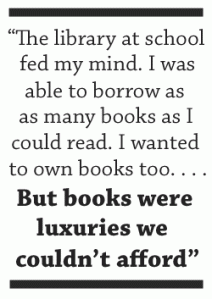
![]() Our recent grant from First Book inspired us to ask our authors about the crucial role multicultural books play in children’s lives. Guest blogger, author/poet Guadalupe Garcia McCall, reveals how the mission of First Book, to get low-income children their very first book, is a reality that many children face, including herself when she was growing up.
Our recent grant from First Book inspired us to ask our authors about the crucial role multicultural books play in children’s lives. Guest blogger, author/poet Guadalupe Garcia McCall, reveals how the mission of First Book, to get low-income children their very first book, is a reality that many children face, including herself when she was growing up.
First Book’s mission to make books accessible to low-income families is very close to my heart. It fills me with joy to hear that such an organization exists. Books are more than important, they fill a basic need in low-income communities—the need to connect to the world. Books for children of poverty represent hope.
As a young girl, I loved books. Books were my friends. They took me places I knew I would never be able to visit because we were poor. After my mother passed away, my father couldn’t leave town to work anymore, so he had to settle for working in Eagle Pass. He did odd jobs, put in a toilet for a friend and got a few bucks. Sometimes he got lucky and someone needed him to take out the flooring on their mobile home and put in a new one; then he had enough money to pay the bills for the month and buy a few groceries. We didn’t have money for anything other than food and bills.
 The library at school fed my mind. I was able to borrow as many books as I could ever read, and I read a lot. I wanted to own books too; I wanted to hold them in my hand and never let them go. But books were luxuries we couldn’t afford. Even though there was a Waldenbooks in the mall, I couldn’t buy a book even if I wanted to. I used to watch other people pull out money and pay for books that I could only touch and admire when I was brave enough to walk into the bookstore, take in the scent of new books, and run my fingers over them, longing to take them home.
The library at school fed my mind. I was able to borrow as many books as I could ever read, and I read a lot. I wanted to own books too; I wanted to hold them in my hand and never let them go. But books were luxuries we couldn’t afford. Even though there was a Waldenbooks in the mall, I couldn’t buy a book even if I wanted to. I used to watch other people pull out money and pay for books that I could only touch and admire when I was brave enough to walk into the bookstore, take in the scent of new books, and run my fingers over them, longing to take them home.
There was only one way I could own a book as a child. Once a month, the public library would have a books sale. Old, tattered paperbacks were a quarter, and if you bought four, you got one free. It used to pain me to ask my father for money for books; there was so little of it to go around. But my father always found a way to get a few dollars into my hands so I could have my books and travel the world in my mind. I learned so much from those books. They shaped me, molded me, made me strong.
 As an author, I try to pay it forward by writing stories that feed young people’s minds and strengthen their spirits. I wrote Summer of the Mariposas to fill a gap. I wanted my Hispanic female students to see themselves as wise, courageous, and strong enough to go on a quest of their own; I wanted them to be brave and become the heroes of their own lives. I wanted to empower them, to give them hope for a better future, to open up the world to them. I am so glad First Books is there to distribute books like Summer of the Mariposas to young women who wouldn’t otherwise have access to them.
As an author, I try to pay it forward by writing stories that feed young people’s minds and strengthen their spirits. I wrote Summer of the Mariposas to fill a gap. I wanted my Hispanic female students to see themselves as wise, courageous, and strong enough to go on a quest of their own; I wanted them to be brave and become the heroes of their own lives. I wanted to empower them, to give them hope for a better future, to open up the world to them. I am so glad First Books is there to distribute books like Summer of the Mariposas to young women who wouldn’t otherwise have access to them.
As an English teacher, I know how important reading is to a child’s development, how directly connected reading is to their success in school. If they can’t read, they won’t be able to have success in any other class or understand any other subject. Reading can either break them or make them. Putting books in the hands of children of low-income families, helping them find that one book that will make them fall in love with reading, will open doors for them. Books will help needy children reach their fullest potential. Books can provide the hope they have been looking for—the gift that will never be forgotten.
Further Reading:
Further Reading:
Pat Mora on reading in English and Spanish
Tony Medina on growing up without books
Joseph Bruchac on the only book in the house








